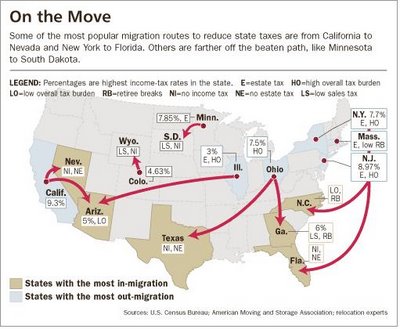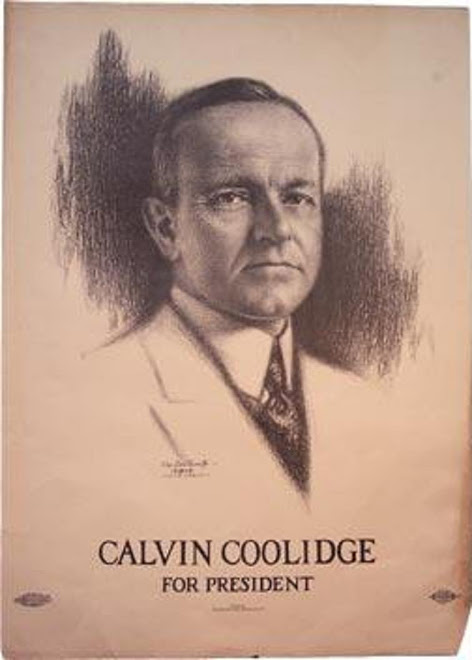This is the concluding installment of a series. The other entries are "Liberty as a Social Compact," "Social Norms and Liberty," "A Footnote about Liberty and the Social Compact," and "Liberty and Federalism." The series is an elaboration of an earlier post, "The Paradox of Libertarianism," which could be read as an introduction. The entire series can be read as a single post, here.Exit Is the KeyExit -- the ability to flee a highly taxed and regulated State (that is, one of the United States) for a somewhat less taxed and regulated State -- remains an option, and those who avail themselves of it are sending a message that is lost in the tumult and shouting of electoral politics. Despite the erosion of local and regional differences in governance -- owing to the centralization of power in Washington and the general expansion of government power at all subordinate levels -- there
is net migration from the Northeast and Midwest toward the "sun belt" States of the South and West (
excluding California), which generally have
lower tax rates and less unionism than the Northeast and Midwest. (Summary statistics on internal migration are
here, at Table H on page 14. An index of economic freedom, by State, is
here.)
It is therefore no coincidence that the
mean population center of the U.S. has since 1960 moved smartly southwestward, from southern Illinois into south central Missouri. Incentives matter; that which enhances economic liberty also enhances personal liberty, for
the two are indivisible. The urge for liberty drives people out of high-tax States and toward (relatively) low-tax States, as illustrated by this graphic from "Revolution on Wheels" (
Barron's Online, February 13, 2006):

The lesson here is simple: As long as there is meaningful exit there
can be a race to the top. Exit serves liberty because it enables each person to find that place whose values come closest to his or her preferred way of life. Places deemed among the most attractive will grow in numbers and prosper; places deemed less attractive will wither, economically if not in terms of population. Under the right conditions (to which I will come), the balance will tilt toward liberty, that is, toward a
modus vivendi that seems, for most people, to offer happiness. That is the essence of federalism, as it was envisioned by the Framers.
But, today, the 50 States (and their constituent municipalities) are incompatible with the kind of federalism envisioned by the Framers. Today's State and municipal governments are too bureaucratic and too beholden to special interests; they have become smaller versions of the federal government. A devolution of power to the States would advance liberty in some States, but it would fall well short of reversing the depradations of liberty
that began in earnest with the New Deal. For, in today's populous States and municipalities, coalitions of minority interests are able to tyrannize the populace. (The average State today controls the destinies of 25 times as many persons as did the average State of 1790.) Those Americans who "vote with their feet" do not escape to regimes of liberty so much as they escape to regimes that are less tyrannical than the ones in which they had been living.
The kind of federalism envisioned by the Framers -- and the kind of federalism necessary to liberty -- would require the devolution to small communities and neighborhoods of all but a few powers: war-making, the conduct of foreign affairs, and the regulation of inter-community commerce for the sole purpose of ensuring against the erection of barriers to trade. With that kind of federalism, the free markets of ideas and commerce would enable individuals to live in those communities and neighborhoods that best serve their particular conceptions of liberty. (To grasp this critical point, please read or re-read the preceding installments of this series:
here,
here,
here, and
here.)
A "Modest" Proposal for an Experiment in LibertyUnfortunately, most proponents of federalism remain fixated on the State as the common denominator. Consider the
Free State Project,
an agreement among 20,000 pro-liberty activists to move to New Hampshire, where they will exert the fullest practical effort toward the creation of a society in which the maximum role of government is the protection of life, liberty, and property. The success of the Project would likely entail reductions in taxation and regulation, reforms at all levels of government to expand individual rights and free markets, and a restoration of constitutional federalism, demonstrating the benefits of liberty to the rest of the nation and the world.
Why New Hampshire?
After obtaining 5,000 committed members, the FSP membership voted and chose New Hampshire. The vote was conducted in accordance with the Participation Guidelines; detailed results of the vote may be found here. The FSP membership selected New Hampshire because of its many political, economic, and cultural advantages, which can be seen in our NH Info page. In addition, New Hampshire's low population ensures that each individual can have an effect on the political system.
Why not Missouri, which has an excellent
index of economic freedom, celebrates an early
tax freedom day, and generally has better weather than New Hampshire (except for skiing). Better yet, why not a county or city in a State like Missouri? Best yet, why not convince the federal government and a State to perform an experiment by allowing the establishment of a "zone of liberty" within a State -- an experiment in liberty, if you will. If it succeeds, others will flock to it or demand the establishment of similar zones of liberty. If it fails . . . well, that seems unlikely.
What do I have in mind? A zone of liberty would be something like a "new city" -- with a big difference. Uninhabited land would be acquired by a wealthy lover (or lovers) of liberty (call him or them the "developer"). The zone would be populated initially by immigrants, who would buy parcels of land from the developer, and who would be allowed to build the home or business of their choosing on the land that they buy. Sub-developers would be allowed to acquire large parcels, subdivide those parcels, and attach perpetual covenants to the use of the subdivided parcels -- covenants that initial and subsequent buyers would knowingly accept. Absentee ownership would be prohibited.
Infrastructure would be provided by competing vendors of telecommunications and transportation services. Rights-of-way would be created through negotiations between vendors and property owners. Any resident homeowner or businessperson could import or export any article from or to any place, including another country; there would be no import controls, duties, or tarrifs; the only restrictions on commerce would be those that are imposed by outside governments.
A zone's government would comprise an elected council, a police force, and a court (all paid for by assessments based on the last sale price of each property in the zone). The police force would be empowered to keep the peace among the residents of the zone, and to protect the residents from outsiders who come into the zone without permission from a resident and/or who breach the peace. Breaches of the peace would be defined by the development of a common law through the court. The elected council (whose members would serve single, four-year terms) would oversee the police force and court, and would impose the assessments necessary to defray the costs of government. The council would have no other powers, and it would be able to exercise its limited powers only by agreement among three-fourths of the members of the council. The members, who would not be salaried, would annually submit a proposed budget to the electorate, which would have to approve the budget by a three-fourths majority. The electorate would consist of every resident who is an owner or joint owner of a residence or business (not undeveloped land), and who has attained the age of 30.
A zone of liberty would not be bound by federal, State, or local statutes, except that the federal government could impose a per-capita tax on residents of the zone that is sufficient to defray the zone's per-capita share of the national budget for defense and foreign affairs. The actions of the zone's government would be reviewable only by the U.S. Supreme Court, and then only following the passage of a bill of particulars by two-thirds of the number of U.S. Senators and Representatives, which must be signed by the President. (A zone could be abolished only with the approval of four-fifths of both houses of Congress
and the President.)
Absent such an experiment, I fear that organized minorities will continue to constrain liberty, mooting even the modest degree of inter-State migration that now prevails. Our only hope for liberty -- albeit a slim one -- would then rest in the hands of the
Supreme Court.
I am being realistic in my assessment of what it would take to attain something like liberty in the United States: either an upheaval of the Supreme Court or the creation of something like zones of liberty. Politics as usual will only take us further down the road to serfdom. Frankly, I see little chance of averting serfdom. All I can do is propose an alternative -- unlikely as it is -- and pray.
The Moral of the StoryThe bottom line of this series:
- Liberty suffers when a central government does more than make war, conduct foreign affairs, and regulate inter-State commerce for the sole purpose of ensuring against the erection of barriers to trade.
- Liberty suffers when a central government imposes rules on all at the instigation of the majority or coalitions of minorities.
- Liberty thrives when the rules that govern relations among the members of a group are agreed among the members of the group -- even if those rules vary from group to group. One group's liberty may be another group's strait-jacket, and vice versa.
It is easy to say that liberty consists of doing what we please as long as what we do does not bring harm to others. It is very hard to say what will and will not do harm. Socially evolved norms offer the best guide. We ignore and summarily reject those norms at great peril to liberty.
The simplistic definition of liberty -- do as you please but do no harm to others -- is superficially appealing. But it glides over the definition of harm, which may vary widely from group to group. Those who advocate abortion and same-sex marriage, for instance, may see those practices as harmless, but they fail to take into account the downstream effects of those practices on civility, without which life would be "
solitary, poor, nasty, brutish, and short."
Those who wish to live the simplistic libertarian life of "do no harm to others" are welcome to it, if they can find it in a group of like-minded persons. There is no such thing as a neutral or objective definition of "harm." Simplistic libertarians merely have a particular conception of "no harm" that they should not be able to impose
on others who disagree with that conception. I, for example, do not wish to be bound by the simplistic libertarians' blind adherence to the non-aggression principle, which is both fatuous and suicidal. (See
this,
this,
this,
this, and
this.)
That is why it is so important to devolve most governmental power to small groups. Doing so enables exit and makes it more likely that leaving will be rewarded by finding membership in a more congenial group. (For that reason I would constrain the size and membership of each zone of liberty, creating more of them instead of allowing any one of them to grow beyond the size of a small village -- perhaps not exceeding a population of
150.)
In conclusion, true liberty can be found in these four rules:
- A group's behavior must be governed by norms that have evolved among its members, rather than being forced on them through executive, legislative, or judicial edict. (Though legislation, if backed by a super-majority of the populace, may reflect evolved norms.)
- The norms must be susceptible of further, unforced change.
- Dissidents must be free to state their dissent openly, without fear of coming to physical harm at the hands of society or the state. (One must accept the possibility of disapproval, and even ostracism, but disapproval and ostracism are much less likely if one begins as an accepted member of a social group.)
- Dissidents must be free to leave, without paying any penalty other than the cost of leaving.









